A series of lectures of Wencui Yinghua were successfully held by School of Foreign Studies in the eighteenth Bocui Festival from Nov. 29, to Dec. 20, 2020. There were totally 13 lectures in the series, and the speakers are mainly from China, Russia, Britain, France, Canada, Kyrgyzstan, Tajikistan and Sudan.Based on energy and humanity research in countries along B&R, these lectures aimed to build a bridge for cultural exchanges between China and other countries.
Three lectures in the first week:
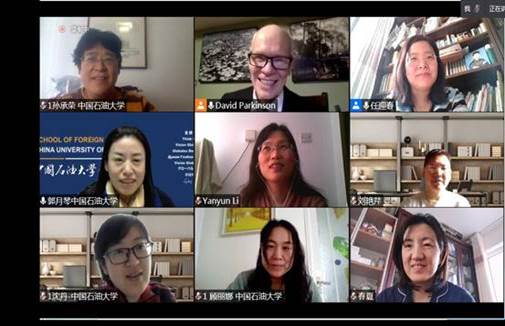
Lecture Scene of David J.Parkinson
The first lecture, titled “A Dialogue Between Chinese and Western Research Principles”, was delivered by David J. Parkinson who is the tenured professor of University of Saskatchewan in Canada. More than 150 people attended it online, including teachers and students from our School of Foreign Studies as well as other universities. Centering around principles of scientific research on western humanity, Dr. David Parkinson mainly talked about topic selection, literature review and research methods and uncovered the cultural and philosophical basis behind them. Taking abstracts from highly cited papers in CNKI as examples, he analyzed the differences and similarities on humanity research between China and the west from the perspective of a western scholar and gave his own opinions which offered a new perspective for all attendees who had a hot discussion in the end.
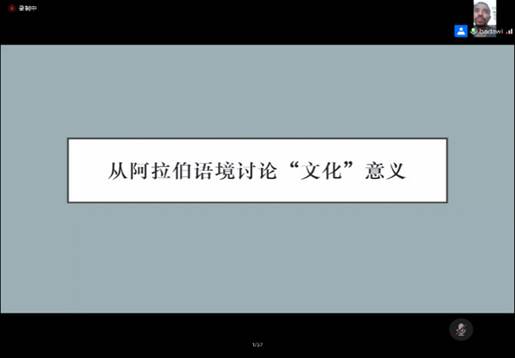
Lecture Scene of Dr. Badawi
Dr. Badawi, director of Chinese Department of Faculty of Arts, University of Khartoum in Sudan, gave a lecture on “Humanistic Culture Heritage and Historical Memory of Arab”. Beginning with the connotation of the word “culture”, he introduced Arab States and League of Arab States from geographical and political perspectives. In addition, the Arabic customs and cultures were shared in details, including language and culture, Arabic traditional foods, clothes and weddings, and social status of the female. What’s more, he explained the popularity of Chinese in Arab and his own zest for Chinese and culture behind it. During the lecture, both his standard Chinese and interesting lecturing style surprised all the participants.
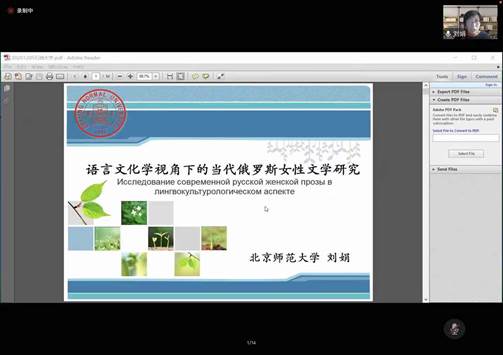
Lecture Scene of Professor Liu Juan
Liu Juan, professor of School of Foreign Studies of Beijing Normal University, gave a lecture on “Literature Research of Contemporary Russian Female from the Perspective of Language and Culture”. Starting from language culturology, she expounded on the relationship between language and culture as well as the important functions of their relationship on cross-cultural communication. About contemporary Russian female literature, the features, research status, research methods and significance as well as research necessities and possibilities were explained systematically. After that, she suggested the concrete research direction as well as its difficulties. Finally, she emphasized that language study can not be separated from the cultural background behind it. She not only made detailed explanation of theories but also gave profound analysis combining with cases in an easy-to-understand way.
Four lectures in the second week:
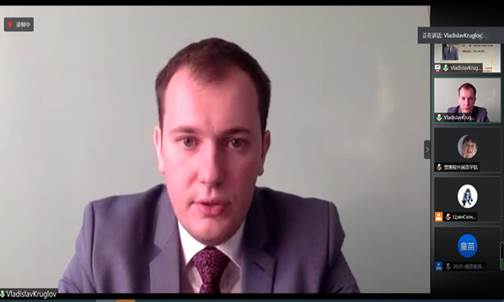
Lecture Scene of Director Vladislav Kruglov
Vladislav Kruglov, director of Chinese Research Office of Moscow Education Technology Center, delivered a lecture on “The Spread and Charm of Chinese in Russia”. Starting with the Chinese study in Russia, he introduced a long history of it and listed Russian sinologists and translators as well as their research achievements on ancient Chinese books from which students can know more about the acceptability of Chinese in Russia. What’s more, he expounded on the principles in the compilation of Chinese textbooks and its current situation. All in all, director Kruglov gave us a detailed and explicit presentation with relative cases and authoritative references that benefits us a lot.
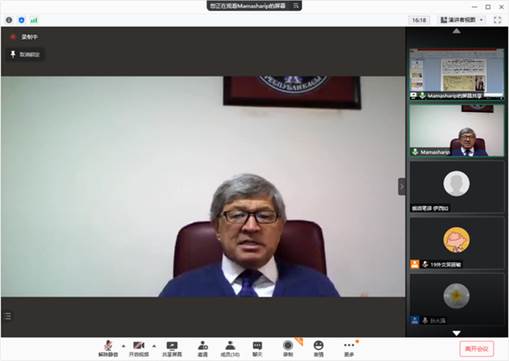
Lecture Scene of Professor Mamasharap Chotonov
Professor Mamasharap Chotonov, President of Kyrgyz State University of Culture and Arts, delivered a lecture on “The Functions of Culture in Promoting B&R”. Firstly, he introduced the historical origin of relationship between the ancient silk road and Kyrgyzetan, and gave a detailed explanation of outstanding traditional Chinese culture’s contribution to his country since the launch of B&R. On the one hand, teachers and students know well about the crucial functions of B&R in spreading splendid Chinese culture to countries alongside. On the other hand, Chinese culture contributes to the development of B&R and attracts the participation of more countries. By the end of the lecture, teachers and students asked questions actively and the professor answered them one by one.
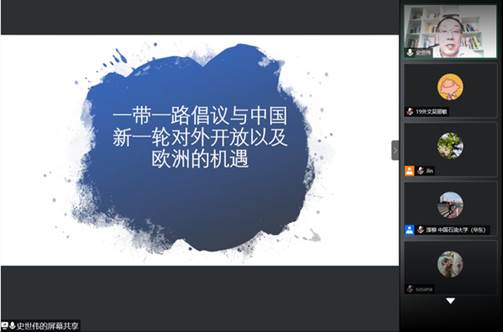
Lecture Scene of Professor Shi Shiwei
Professor Shi Shiwei from School of Foreign Studies of University of International Business and Economics,talked about “B&R and China’s New Round of Opening Up as Well as Opportunities Offered to Europe”. First of all, professor Shi introduced the origin of B&R, and then the backgrounds, reasons, connotations, processes and achievements were explained successively. With the help of charts and data, he explained B&R’s contributions to the opening up of China’s economy. At the same time, he gave a deep analysis of four historical courses of China’s opening up and the finally formed overall structure. In addition, he mentioned the opportunities offered to Europe by B&R.
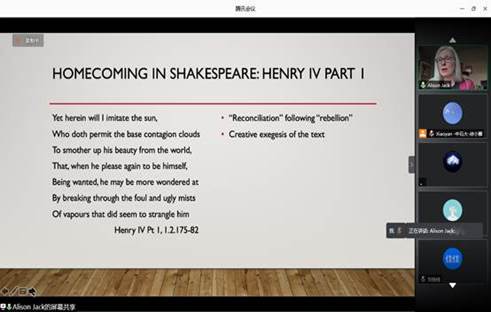
Lecture Scene of Dr. Alison Jack
Dr. Alison Jack who is from University of Edinburgh gave a lecture of “Homecoming in English Literature”. First of all, she introduced the origin and content of The Prodigal story and different connotations of the word “prodigal”. She pointed out that it is an important story in English literature because the plots of home-returning and complicated relationship between children and parents appeared frequently in poems, fictions and plays. By interpreting Shakespeare’s King Lear, George Eliot’s Adam Bader, Bret Harte’s short stories and Elizabeth Bishop’s poems, she talked about severe consequences caused by son’s fleeing and the possibilities of coming back. Through this lecture, we know that people yearn for returning home. But in English literature, the homecoming can not be ended with happiness all the time. In the end, attendees had a hot discussion about the characters in The Prodigal as well as its influence on literature of other countries and cultures.
Six lectures in third week:
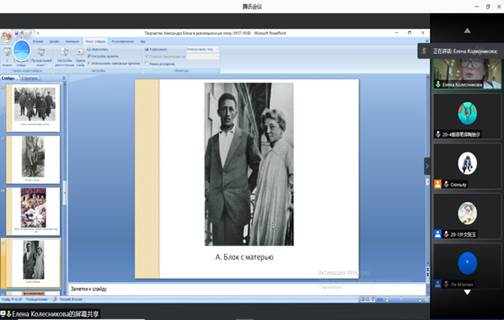
Lecture Scene of Professor Yelena Ivanovna Kolesnikova
Professor Yelena Ivanovna Kolesnikova from Institute of Russian literature, Russian Academy of Sciences, gave a lecture on “Aleksandr Blok’ s Literary Creation in 1917-1918”. Starting with Blok’ s personal experience, she pointed out that his early experience and emotion relationship had decisive effects on his literature creation. Then, through Blok’s famous long poem The Twelve, she introduced not only Blok’s creation features, but also his creation courses in Russian Revolution by some posters and pictures. In the end, a hot Q&A session was opened up.
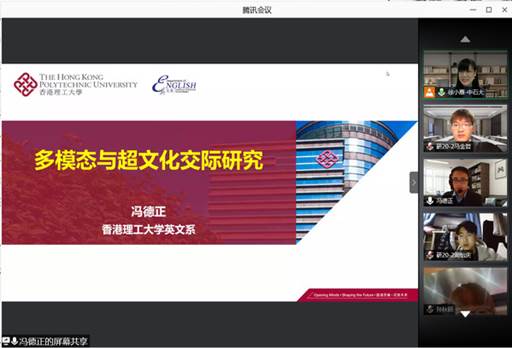
Lecture Scene of Dr. Feng Dezheng
Dr. Feng Dezheng from The Hong Kong Polytechnic University delivered a lecture on “Research on Multimodal and Transcultural Communication”. Dr. Feng introduced three stages in cross-cultural communication and pointed out that it was Internet media especially social media that made it common, ordinary, multimodal with showing transcultural features. At the same time, he encouraged students of foreign language to open their eyes in study. In addition, he thought that we should own dynamic features of cultural identity to communicators’ constant construction of communicative environment by a variety of multimodal resources. And he presented the main features of contemporary Chinese transcultural vividly through TikTok video and Li Ziqi’ video. Dr. Feng’s interesting way of lecturing evoked students’ positive discussion.
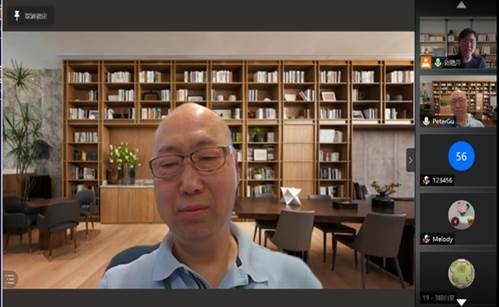
Lecture Scene of Dr. Gu Yongqi
Gu Yongqi who is from Victoria University of Wellington gave a lecture on “Vocabulary Learning Strategies” which included three parts: connotation of vocabulary, strategies and suggestions of vocabulary learning. He suggested that learners should make clear their learning target and vocabulary level so as to choose appropriate learning strategies. We should learn vocabulary in context and form the habits of using words frequently. Dr. Gu’s deep and vivid explanation was characterized by practicability and academic value. He presented some wrong ideas of Chinese students in vocabulary learning by use of concrete data in research, which was of great significance to our later vocabulary study.
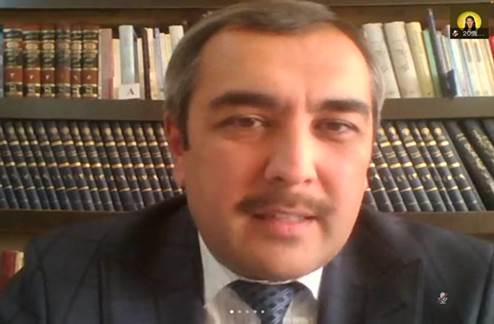
Lecture Scene of Professor Murodi
Professor Murodi from Khujand National University in Tajikistan, gave a lecture on “China and Tajikistan in Historical and Cultural Relations”. Firstly, he introduced the historical origins of the relationship between two countries and the excellent traditional Chinese culture’s influence on Tajikistan in the course of historical development. In addition, China-Tajikistan cultural exchanges and historical allusions in all ages were explained, through which both teachers and students had a deep understanding of solid cultural origin and its positive functions. In the end, he made a detailed introduction of the communication and cooperation between two countries in this stage.
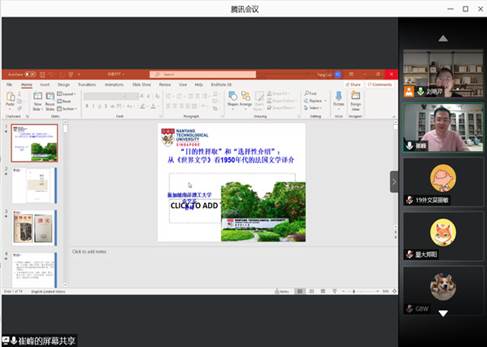
Lecture Scene of Dr. Cui Feng
Dr. Cui Feng, director of MTI in School of Humanities, Nanyang Technological University, Singapore, gave a lecture on “Purposeful Selection and Selective Introduction:Translation of French literature in 1950s from the perspective of World Literature”. He put the research of “The Literary Circle in Chinese Mainland and Translation of French Modernist Literature in 1950s” under the context of China’s development in 1950s-1960s in order to observe three phenomena: purposeful selection and selective introduction, literary fame changes of the original book and its author during the process of transmission and the interaction between translator’s subjectivity and mainstream ideology in target language. In Q&A session, Dr. Cui had a deeper discussion about selective translation of foreign literature in China with attendees. It has referential values for the spread of Chinese culture and translation of Chinese academic work overseas.
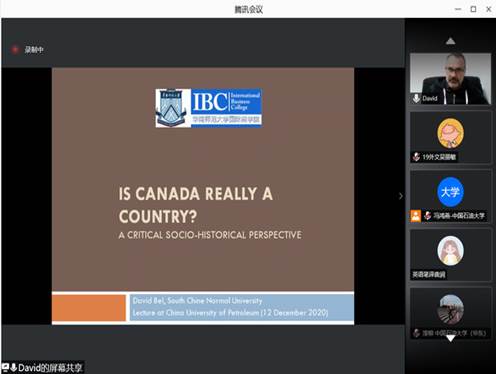
Lecture Scene of Dr. David BEL
Dr. David BEL, associate professor of National Committee on Language Studies of French Universities, gave a lecture of “Is Canada Really a Country?” First of all, he showed positive and negative arguments on this topic from the perspectives of national territory, head of government and nation’s capital, and then went further. Based on the critical socio-historical theory, Dr. David elaborated the theme of the lecture from three aspects: Canadians aspiration for unity, city development in Canada in these years, and the political, linguistic and geographical dimensions, which left a profound impression on students.
The success of the Series of Lectures of the Eighteenth Bocui Festival laid solid foundation on scientific research and international cooperation of our School. Besides, it has not only expanded teachers and students’ minds but also inspired them in academic research. What’s more, through these lectures, they know about the function of cultural communication in B&R from various perspectives. And they have acquired a deep understanding of the role of B&R in China’s opening up to the outside world at the new stage and have made sure their responsibility of cultural communication and spreading as foreign language learners.
Translators: Gao Hongyan
Proofreader: Chun Liu, Wang Zimeng
Tutor: Chun Liu



